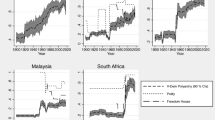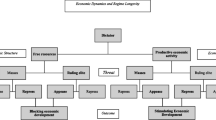Abstract
Rebel governance remains a curious phenomenon. Some have argued that certain manifestations of this curious behavior may even facilitate postwar democratization. Using Weibull models and a variety of measures of democracy and interpretations thereof, this paper tests three potential relationships between rebel governance and the timing of democratic transition. The first rests on the role that consultation can play in raising expectations among civilians of the same after the war’s end. The second posits that policing and juridical functions allow rebel rulers to more easily repress dissent, making democratization more remote. The third is a replication of Huang’s thesis which posits that rebels’ need of civilian material inputs gives civilians leverage in making claims of their rebel rulers. The analysis finds that consultation accelerates postwar democratization and civil mobilization accelerates partial democratization, but while policing and juridical functions appear to slow these transitions, the models are uncertain regarding this relationship.
Similar content being viewed by others
References
Albert, K. 2020 Rebel Quasi-state Institutions Dataset. Available at https://rebelgovernance.weebly.com/data.html accessed 29 Dec 2022.
Almond, G., and S. Verba. 1963. The Civic Culture: Political Attitudes and Democracy in Five Nations. Princeton, NJ: Princeton University Press.
Alvarez, F.A. 1988. Transition Before the Transition: The Case of El Salvador. Latin American Perspectives 15 (1): 78–92.
Arjona, A. 2014. Wartime Institutions: A Research Agenda. Journal of Conflict Resolution 58 (8): 1360–1389.
Arjona, A. 2016. Rebelocracy: Social Order in the Colombian Civil War. New York, NY: Cambridge University Press.
Austin, P.C., and E.W. Steyerberg. 2015. The number of subjects per variable required in linear regression analyses. Journal of Clinical Epidemiology 68 (6): 627–636.
Bakonyi, J., and K. Stuvøy. 2005. Violence & Social Order beyond the State: Somalia & Angola. Review of African Political Economy 32 (104/105): 359–382.
Barbu, Z. 2013. Democracy and Dictatorship. New York, NY: Routledge.
Boese, V.A. et al 2022. Autocratization Changing Nature? Democracy Report 2022. Varieties of Democracy Institute (V-Dem).
Boix, C., M. Miller, and S. Rosato. 2013. A Complete Dataset of Political Regimes, 1800–2007. Comparative Political Studies 46 (12): 1523–1554.
Boix, C. Miller, M., and Rosato, S. 2022. Boix-Miller-Rosato Dichotomous Coding of Democracy, 1800-2020. Available at https://dataverse.harvard.edu/dataset.xhtml?persistentId=doi:10.7910/DVN/FENWWR accessed 1 July 2022.
Cliffe, S., and Manning, N. 2008. Practical Approaches to Building State Institutions. In: C.T. Call and V. Wyeth (eds.) Building States to Build Peace, edited by Charles T. Call and Vanessa Wyeth. Boulder: Lynne Rienner, 163–184.
Crumer, A.M. 2011 Comparison between Weibull and Cox proportional hazards models. MS Thesis. Kansas State University. http://hdl.handle.net/2097/8787.
Davenport, C. 2007. State Repression and the Tyrannical Peace. Journal of Peace Research 44 (4): 485–504.
Davenport, C. 2010. Media Bias, Perspective, and State Repression: The Black Panther Party. New York, NY: Cambridge University Press.
Dewey, J. 1929. Philosophy and Democracy. In: Ratner J. (ed.) Characters and Events: Popular Essays in Social and Political Science Vol II. New York, NY: Henry Hold and Company, 841–856
Dewey, J. 1967. The Foundation of Democracy. In Communism, Fascism, and Democracy: The Theoretical Foundations, ed. C. Cohen, 674–677. New York, NY: Random House.
Fink, C. 2001. Living Silence: Burma under Military Rule. London, UK: Zed Books.
Freire, P. 2005. Pedagogy of the Oppressed. Translated by M.B. Ramos. New York, NY: Continuum
Galula, D. 2006. Counterinsurgency Warfare: Theory and Practice. CT: Praeger Security International: Westport.
Goodwin, J., and T. Skocpol. 1989. Explaining Revolutions in the Contemporary Third World. Politics & Society 17 (4): 489–509.
Gowrinathan, N., and Z.C. Mampilly. 2019. Resistance and Repression under the Rule of Rebels: Women, Clergy and Civilian Agency in LTTE Governed Sri Lanka. Journal of Comparative Politics 52 (1): 1–20.
Guevara, C. 1998. Guerilla Warfare. Lincoln, NE: University of Nebraska Press.
Hammond, J.L. 1998. Fighting to Learn: Popular Education and Guerilla War in El Salvador. New Brunswick: Rutgers University Press.
Hartzell, C.A. 2014. Data Set for Hartzell’s Mixed Motives: Explaining the Decision to Integrate Militaries at Civil War’s End. https://www.carolinehartzell.com/uploads/4/0/3/7/40375771/licklider_military_integration_project_4.dta, Accessed 3 Feb 2016
Hayword, C.R. 1998. De-Facing Power. Polity 31 (1): 1–22.
Huang, R. 2016. The Wartime Origins of Democratization: Civil War, Rebel Governance, and Political Regimes. New York, NY: Cambridge University Press.
Ishiyama, J., and P. Basnet. 2022. Born out of civil wars: Are former rebel parties an organizationally distinct type of party? Party Politics. https://doi.org/10.1177/13540688221144713.
Ishiyama, J., and M. Widmeier. 2020. From ‘bush bureaucracies’ to electoral competition: What explains the political success of rebel parties after civil wars? Journal of Elections, Public Opinion, and Parties 30 (1): 42–63.
Kalyvas, S.N. 2006. The Logic of Violence in Civil War. New York, NY: Cambridge University Press.
Kaplan, O. 2017. Resisting War: How Communities Protect Themselves. New York, NY: Cambridge University Press.
Kasfir, N. 2015. Rebel Governance – Constructing a Field of Inquiry. In Rebel Governance in Civil War, ed. A. Arjona, N. Kasfir, and Z. Mampilly, 21–46. New York, NY: Cambridge University Press.
Knight, A. 2018. To Build or Cultivate: Rebel Governance and Democratization. PhD Diss: Rutgers University, New Brunswick, NJ.
Knight, A. 2020. Rebel Governance Data Set. Available at https://adamknightpol.com/rebel-governance-data-set/, Accessed 28 Sept 2022.
Licklider, R. 1993. How Civil Wars End: Questions and Methods. In: R. Licklider (ed.) Stopping the Killing: How Civil Wars End. New York, NY: New York University Press.
Linz, J.J., and A. Stepan. 1996. Problems of Democratic Transition and Consolidation: Southern Europe, South America, and Post-Communist Europe. Baltimore, MD: The Johns Hopkins University Press.
Lukács, G. 1971. History and Class Consciousness: Studies in Marxist Dialectics. Translated by R. Livingston. Cambridge, MA: The MIT Press.
Lyons, T. 2016. The Importance of Winning: Victorious Insurgent Groups and Authoritarian Politics. Comparative Politics 48 (2): 167–184.
Mampilly, ZC. 2007. Stationary Bandits: Understanding Rebel Governance. PhD Diss, UCLA, Los Angeles, CA.
Mampilly, Z.C. 2011. Rebel Rulers: Insurgent Governance and Civilian Life During War. Ithaca, NY: Cornell University Press.
Mampilly, Z.C. 2015. Performing the Nation-State: Rebel Governance and Symbolic Processes. In Rebel Governance in Civil War, ed. A. Arjona, N. Kasfir, and Z. Mampilly, 74–97. New York, NY: Cambridge University Press.
Manning, C.L. 2008. The Making of Democrats: Elections and Party Development in Postwar Bosnia, El Salvador, and Mozambique. New York, NY: Palgrave MacMillan.
McClintock, C. 1998. Revolutionary Movements in Latin America. Washington, DC: United States Institute of Peace.
Minter, W. 1991. The US and the War in Angola. Review of African Political Economy 50: 135–144.
Negroponte, D.V. 2012. Seeking Peace in El Salvador: The Struggle to Reconstruct a Nation at the End of the Cold War. New York, NY: Palgrave MacMillan.
Nilsson, M. 2012. Reaping what was sown: Conflict outcome and post-civil war democratization. Cooperation and Conflict 47 (3): 350–367.
Olson, M. 1993. Dictatorship, Democracy, and Development. The American Political Science Review 87 (3): 567–576.
Organski, A.F.K., and J. Kugler. 1980. The War Ledger. Chicago, Il: The University of Chicago Press.
Paris, R. 2004. At War’s End: Building Peace After Civil Conflict. New York, NY: Cambridge University Press.
Paul, C., C.P. Clarke, and C.C. Serena. 2014. Mexico is not Colombia: Alternative Historical Analogies for Responding to the Challenges of Violent Drug-Trafficking Organizations. Santa Monica, CA: RAND Corporation.
Pearce, J. 2015. Political Identity and Conflict in Central Angola, 1975–2002. New York, NY: Cambridge University Press.
Plümber, T., and E. Neumayer. 2010. The level of democracy during interregnum periods: Recoding the polity2 score. Political Analysis 18 (2): 206–226.
Rawat, A. 2017. Binary Logistic Regression. Towards Data Science, 31 October. https://towardsdatascience.com/implementing-binary-logistic-regression-in-r-7d802a9d98fe, Accessed 4 Feb 2023.
Sabates-Wheeler, R., and P. Verwimp. 2014. Extortion with Protection: Understanding the effect of rebel taxation on civilian welfare in Burundi. Journal Conflict Network 58 (8): 1474–1499.
Scott, J.C. 1990. Domination and the Arts of Resistance: Hidden Transcripts. New Haven, CT: Yale University Press.
Strong, S. 1992. Shining Path: Terror and Revolution in Peru. New York, NY: Times Books.
Tilly, C. 1990. Coercion, Capital, and European States, AD 990–1990. Cambridge, MA: Basil Blackwell Ltd.
Tilly, C. 2007. Democracy. New York, NY: Cambridge University Press.
Todd, M. 2010. Beyond Displacement: Campesinos, Refugees, and Collective Action in the Salvadoran Civil War. Madison, WI: University of Wisconsin Press.
Toft, M.D. 2010. Securing the Peace: The Durable Settlement of Civil Wars. Princeton, NJ: Princeton University Press.
Vittinghoff, E., and C.E. McCulloch. 2006. Relaxing the Rule of Ten Events per Variable in Logistic and Cox Regression. American Journal of Epidemiology 165 (6): 710–718.
Vreeland, J.R. 2008. The Effect of Political Regime on Civil War: Unpacking Anocracy. The Journal of Conflict Resolution 52 (3): 401–425.
Wade, C. 2008. El Salvador: The Success of the FMLN. In From Soldiers to Politicians: Transforming Rebel Movements After Civil War, ed. J. de Zeeuw, 33–51. Boulder, CO: Lynne Rienner Publishers.
Way, L. 2002. Pluralism by Default in Moldova. Journal of Democracy 13 (4): 127–141.
Weibull.com. 2002. Characteristics of the Weibull Distribution. https://www.weibull.com/hotwire/issue14/relbasics14.htm, Accessed 28 Sept 2022
Wickham-Crowley, T. 1991. Ideology and Revolution? The Limitations of Consciousness Raising in Revolutionary Struggles. In Exploring Revolution: Essays on Latin American Insurgency and Revolutionary Theory, ed. T. Wickham-Crowley, 104–147. Armonk, NY: M.E. Sharpe Inc.
Wood, E.J. 2003. Insurgent Collective Action and Civil War in El Salvador. New York, NY: Cambridge University Press.
Acknowledgments
The author thanks Roy Licklider, Manus Midlarsky, Harvey Waterman, Caroline Hartzell, Meaghan Knight, and the anonymous reviewers for critiques and suggestions that greatly improved this article.
Author information
Authors and Affiliations
Corresponding author
Additional information
Publisher's Note
Springer Nature remains neutral with regard to jurisdictional claims in published maps and institutional affiliations.
Rights and permissions
Springer Nature or its licensor (e.g. a society or other partner) holds exclusive rights to this article under a publishing agreement with the author(s) or other rightsholder(s); author self-archiving of the accepted manuscript version of this article is solely governed by the terms of such publishing agreement and applicable law.
About this article
Cite this article
Knight, A. Praxis makes perfect: rebel governance, repression, and democratization. Int Polit (2023). https://doi.org/10.1057/s41311-023-00451-x
Accepted:
Published:
DOI: https://doi.org/10.1057/s41311-023-00451-x




